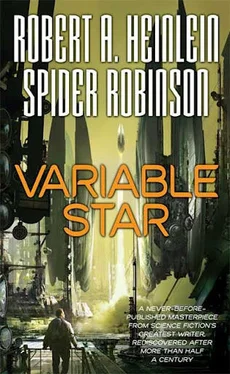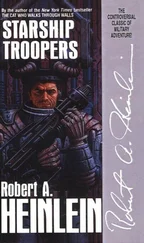I did arrange for a few musicians I knew to get their demos listened to at Apple. But I knew as I did it that it was a message in a bottle, and would probably be my last contact with the Solar System. And unless any of them could afford to spring for telepathy, it was going to be something like five years at a minimum before I could possibly hear any results. They would crawl after us at the speed of light, and we were moving at well over ninety-five percent of that ourselves by now.
Psychologically, I was already becoming a Brasil Novan.
And I wasn’t the only one. As we entered our sixth year, most of us had experienced similar changes. Hits at the ship’s System News website registered a steady decline, without reference to the juiciness of the headlines or sexual attractiveness of those depicted. Mail traffic to sternward showed a similar trend curve.
Terra, Luna, the O’Neills, Mars, Ganymede, the Belt—all of them had become The Old Country. To our children, some of them now three years old, they weren’t even going to be that. When they grew up they’d have trouble keeping them all straight. “I forget, Dad—was surfing invented on Mars, or Luna? I can never remember which one of you had to live inside of.” All but a handful of their own children would possess such information for only one week of their lives, right before final exam week, and then discard it forever with no ill effect.
We not only started to realize that, we started to be okay with it.
We began in subtle ways to function less like a collection of random refugees in a temporary shelter, and more like a community.
There was a fairly long period in its history when Canada was a collection of isolated outposts, its citizens separated by vast gulfs of uninhabitable space and incompatible regional interests, even different languages. Yet they found it possible to maintain a solid, workable sense of national identity based on little more than unusual pleasantness and a shared loathing of their national airline’s coffee.
In the Sheffield , it was green mist jokes and shared loathing of rabbit meat in all forms. And, eventually, all things rabbity. Any joke that ended with a bunny covered in green mist was a surefire laugh.
Nations have been founded on worse.
I don’t suppose many of us really despised rabbit as much as we affected to. But it is a virtually fatless meat, pretty boring no matter how you cook it, even in a ship with good air pressure. And rabbits lend themselves to jokes. Few of us like a coward.
And there were ancillary benefits at which one did not have to turn up one’s nose, for a change: if you rejected rabbit meat, you either ate syntho—unsatisfying—or you were a vegetarian until the livestock got decanted at Bravo. And while vegetarians fart twice as much as carnivores, the farts smell ten percent as bad, or less. There was a noticeable net improvement in… ambience, shipwide.
Things were actually starting to look pretty good, just before everything blew up.
Well, very damn near everything.
My opinions as to the future of Mankind are hedged in by this statement: I think it is necessary for the human race to establish colonies off this planet.
—Admiral Caleb Saunders, interview, Butler, MO, USA, Terra July 7, 1987 (“Anson MacDonald Day”)
You know the date. Everyone does. Everyone always will.
If we’re lucky.
Everyone everywhere has their own story. For me, this is the way the world ended. Not with a whim, but with a banker.
Paul Hattori was a closet soap fiend. We had dozens of them aboard, I had been surprised to discover. But I guess Paul felt an addiction that silly was beneath his dignity as colony banker. I only knew about it because I spent more time than anyone else in Herb’s company.
The phenomenon was perfectly predictable, when you thought about it; I simply never had until I encountered it.
Imagine you are a devoted fan—a much politer term than “addict”—of a daily soap opera. One of the real classics, let’s say. Corry , or The Sands of Mars . And you happen to be on a starship, boosting at a steady one-third gee.
After an arbitrary time… let’s pick 6.41 years. After six years and 150 days of such acceleration, you are traveling at 0.976 c . Naturally you are impressed.
But you’re also frustrated. Because while it’s been six years and change for you, thirteen years have elapsed back in the System. A full six years and 215 days of Corry episodes—representing more than the total time you’ve been traveling—exist, are in the can, and have been seen by billions of people. But you are going to have to wait forever to find out what has happened to all your favorite imaginary friends. You’re outracing the news.
Unless you know a telepath you can go lean on. He’s your one and only source of series cheat sheets.
Paul arrived at Rup-Tooey that afternoon just as Herb was saying good-bye to navigator Mort Alexander and roboticist Guy Atari, who were collaborating on a book and had sought his professional counsel. It had boiled down to “don’t,” but they left undiscouraged. Paul got there in time to hear Herb’s final words of advice: “If you really don’t mind doing twice the work for half the money, we should all get together for poker sometime.”
“Weren’t you a bit hard on them?” Paul asked as the door dilated behind them. He took a seat near Herb’s desk and facing my bed, where I sprawled in lazy comfort reading a biography of Johnny Hodges. We nodded to each other, and I collapsed the display and sat up; I had come to like Paul.
Herb said, “Anyone who can possibly be discouraged from writing should be.” He shuddered slightly. “Besides, the idea of sharing a keypad freaks me out. I’d rather share a toothbrush.”
“I feel the same about my saxophones,” I said.
“I feel the same way about money,” Paul said, deadpan.
“Philistine,” I said.
Herb frowned. “Please—let’s not corrupt the language. It’s pronounced, ‘Fill a stein,’ and I agree, it’s the least he can do.”
Paul sighed theatrically, got up, and went to the fridge, one of several improvements I’d had made to the room. “You, Joel?”
“Sure,” I said. “I presume you’re here for your fix.”
“Can you squeeze me in today, Herb? It’s been a month.”
Herb’s telepathic time had always been pretty heavily booked, and got more so as the voyage went on, and the amount of information that only he and his colleagues Stephanie Gaskin and Gene Rubbicco could supply increased. By now it was a distinct nuisance for Herb to fit things as frivolous as soap opera synopses into his traffic load. But as a nicotinic he did empathize with addiction. And Paul was the recipient of something like a quarter of his usual, official daily traffic. “Yes—but only because I’ve just thought of a pun so hideous I’ve basically lost the will to live.”
Paul brought each of us an opened container of beer, and sat down with one of his own. (There were real glass steins aboard—packed deep in the hold, so we’d still have them when we reached Bravo.) “Okay, I’m seated, and I have beer. Go ahead.” He flinched anticipatorily.
“You spend half your working day staring at the stock situation, concerned about corn futures. Then you come here and pester me so you can get caught up on stock situations and corny futures.”
I groaned. Paul’s nostrils flared. “If you’re calling Corry corny, ya dozey pillock, I’m glad I pissed in that beer.”
“I was referring to the ethanol served at the Rover’s Return, wanker.”
Paul relaxed. “Ah well, ethanol sterilizes anything.”
Читать дальше










